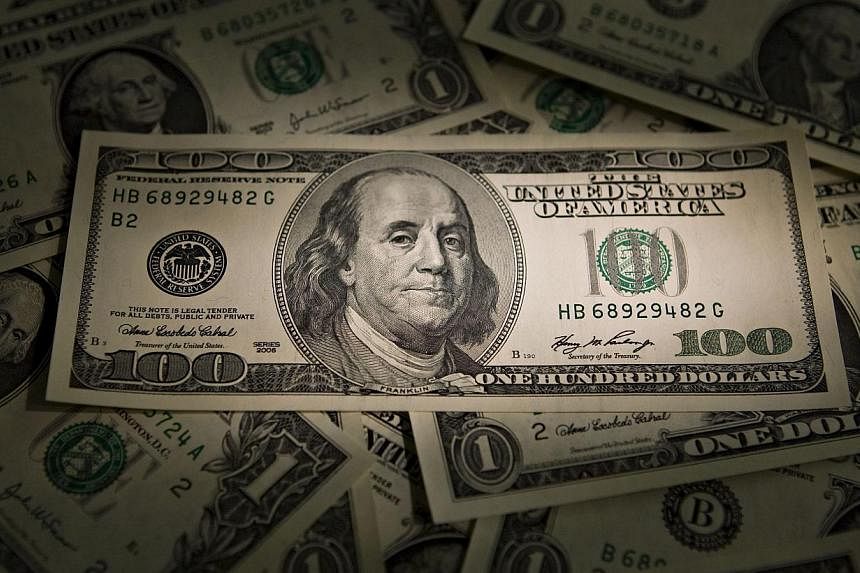WELLINGTON (Bloomberg) - The United States dollar maintained its rally, trading near a 12-year high versus the euro as investors considered the timeline for higher US interest rates ahead of this week's Federal Reserve meeting.
Crude oil extended its slump.
The greenback was at US$1.0498 per euro by 8:16am in Tokyo, after reaching its strongest level since January 2003. The dollar held weekly gains of at least 0.4 per cent versus the currencies of Australia and New Zealand.
Standard & Poor's 500 Index futures slipped 0.1 per cent following a 0.6 per cent drop in the US gauge Friday, while Australian shares retreated and Japanese futures were mixed. Oil slid more than 1.7 per cent in the US and London amid concern over the deepening glut.
The Bloomberg Dollar Spot Index is at a decade high as the prospect of a US rate rise bolsters the appeal of the greenback relative to its global counterparts.
Central bankers from Europe to Asia are easing policy to stoke expansion, with China's Premier Li Keqiang promising in a televised address at the weekend to intervene if growth in the world's No. 2 economy lags too much. Indonesia posts trade data Monday and India reports wholesale prices, before the Fed meets March 17-18.
"This has never happened before," Evan Lucas, a markets strategist in Melbourne at IG, wrote in a client note e- mailed today. "The Fed has never found itself on the other side of global policy and this central bank divergence is making the dollar the most sought-after currency on the planet."
The Bloomberg dollar gauge, which tracks the greenback against 10 major peers, was little changed Monday after climbing 0.8 per cent on Friday to its highest level in data going back to the end of 2004.
The Aussie dollar weakened 0.2 per cent to 76.23 US cents. Minutes of the Reserve Bank of Australia's March 3 meeting, when the key rate was held at 2.25 per cent after a cut in February, are due Tuesday. Traders wager there's a 50 per cent change the RBA will reduce borrowing costs again within six months, according to data compiled by Bloomberg from swap contracts.
Eight of 10 industry groups on the S&P/ASX 200 Index declined in Sydney, with the stock gauge losing 0.7 per cent, while New Zealand's NZX 50 Index rose 0.3 per cent.
BHP Billiton, the world's biggest mining company and Australia's largest oil producer, declined for a 10th straight session, losing 2.4 per cent to be headed for its lowest close since Jan. 29.
Prices for iron ore, Australia's biggest export, fell for the eighth time in nine days at China's Qingdao port on Friday, slipping to a near record low.
West Texas Intermediate crude lost 2.1 per cent to US$43.88 a barrel after sinking 4.7 percent on Friday, and capping a weekly plunge of 9.6 per cent, its steepest drop this year. Brent oil fell 1.8 per cent to US$53.70 per barrel following Friday's 4.2 per cent retreat.
A record surplus in U.S. crude inventories may soon strain the country's storage capacity, renewing the slump in oil prices, the International Energy Agency said Friday. The largest oil-storage hub in the US, located in Cushing, Oklahoma, is 70 per cent full, the agency said.
"We've got this ongoing increase in inventory with no cut in production, despite the drop in the number of shale oil rigs," Ric Spooner, chief markets strategist at CMC Markets in Sydney, said by phone Monday. "We are seeing downside momentum now develop in the market."
Former Fed Chairman Alan Greenspan said oil prices are yet to bottom as US supplies will continue to expand.
"Essentially we are bottling up a huge amount of crude oil in the United States," Greenspan said in an interview with Bloomberg TV on Friday. "Until we find a way to get out of this dilemma, prices will continue to ease because there's no place for that oil to go except into the markets." Futures on Japan's Nikkei 225 Stock Average were bid at 19,210 in the Osaka pre-market, from 19,200 at their close in Japan on Friday. Contracts traded on the Chicago Mercantile Exchange were little changed at 19,210 in early Monday trade. The yen was steady at 121.34 per dollar following last week's 0.5 percent drop, its fourth straight weekly decline.
Contracts on the Hang Seng and Hang Seng China Enterprises gauges in Hong Kong dropped 0.4 per cent and 0.6 per cent respectively in most recent trading, while Singapore-traded futures on the FTSE China A50 Index were down 0.2 per cent on Friday. Kospi index futures in Seoul fell 0.4 per cent.

